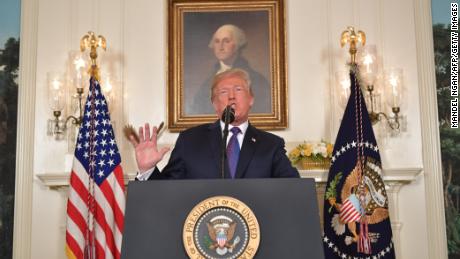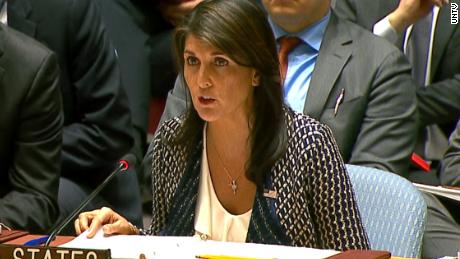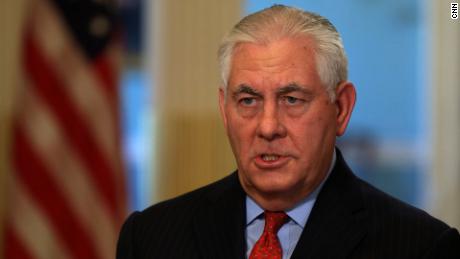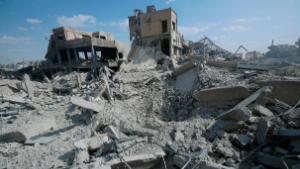Syria strikes: The real impact is in Moscow
(CNN)After nearly a week of tension that sometimes verged on the surreal, the US and its allies finally carried out strikes against regime targets in Syria on Friday night. The strikes, more limited than once seemed likely, were designed to deter the Assad regime's use of chemical weapons once and for all.
Their real impact will be on the plummeting relationship between Moscow and the West.
The arguments over what happened in Douma on April 7 and who was responsible have dragged US-Russian relations to their lowest ebb in decades. On both sides, the rhetoric has been melodramatic, even irresponsible.
US President Donald Trump appeared to surrender any hope of a working relationship with Moscow when he tweeted that "President (Vladimir) Putin, Russia and Iran are responsible for backing Animal Assad" in a "MINDLESS chemical attack in Syria."
He followed up by responding to a Russian threat to shoot down any US missiles by saying: "Get ready Russia, because they will be coming, nice and new and "smart!"

Play Video
Trump's message to Iran and Russia
As the week progressed, Russian officials veered between insisting there had been no attack, that rebel groups had staged it and ultimately that the United Kingdom had planned it in a conspiracy with Syria's White Helmets volunteer rescue group.
Syria strikes related coverage
- Live blog: Latest developments
- US and allies launch Syria strikes
- What we know and don't know
- After Syria strikes, now what?
- Weapons used in strikes on Syria
- Trump's rationale highlights contradictions
Russian Foreign Minister Sergey Lavrov claimed Friday that Moscow had "irrefutable evidence that this was another staged incident and the special services of one state at the forefront of the Russophobic campaign were at play."
Lavrov also scratched an old Russian itch about previous Western interventions in the Middle East. "God forbid anything adventurous will be done in Syria along the lines of the Libyan and Iraqi experience," he said.
Moscow's resentment about the Western intervention in Libya in 2011 borders on the obsessive. Vladimir Putin said Saturday that history "has already laid heavy responsibility on Washington for bloody reprisals against Yugoslavia, Iraq and Libya."
It was left to US Defense Secretary James Mattis and Chairman of the Joint Chiefs of Staff General Joseph Dunford to devise a response that would punish the Assad regime but avoid military escalation with Moscow.
The deterrent effect
Syria pledged to give up all its chemical weapons in 2013 under a Russian-mediated deal after a horrendous attack on civilians not far from the site of the last week's incident. The alternative, threatened by President Obama, was military action.
Either Syria didn't surrender all of its stocks (the view in France and Germany) or it started producing chemical weapons again.
Chemical weapons have killed a tiny fraction of the more than 400,000 Syrians who have died in the civil war. But to the US and much of the international community, the use of these weapons is especially abhorrent. British Prime Minister Theresa May spoke of the "erosion" of the global ban on chemical weapons, while the senior UN official for disarmament, Thomas Markram, told the Security Council on Monday: "The use of chemical weapons cannot become the status quo, nor can we continue to fail the victims of such weapons."

Play Video
Haley slams Russia at UN Security Council
That was the Trump Administration's view when it launched cruise missiles against a Syrian airbase a year ago following the sarin attack on civilians at Khan Sheikhoun. Those strikes were meant as a deterrent; as such they failed. As the International Rescue Committee said this week, the response to Khan Sheikhoun "did not change the calculus of the warring parties nor make Syrian civilians safer."
The choice this time was a larger deterrent -- or be seen as a blowhard. But escalation brings with it risks of a wider conflict, risks the Russians have been keen to proclaim.
Mattis told a Congressional hearing Thursday: "On a strategic level it's how do we keep this from escalating out of control?" The Russian ambassador to the UN, Vassily Nebenzia, painted a darker picture when he said the priority was to avert war. Asked if he was referring to war between the United States and Russia, he replied: "We cannot exclude any possibilities, unfortunately."
A nadir for Washington and Moscow
The greatest impact of these strikes is that they will deepen the visceral hostility that characterizes relations between the US and Russia, now at their lowest ebb in decades.
Moscow's delight at Donald Trump's election victory gave way to frustration and then alienation as investigations into Russian interference in the 2016 election dragged on.
There were some chinks of light: President Trump often said that getting along with Putin was desirable. Last summer, the US and Russia agreed to supervise a deconfliction zone in southern Syria. When Trump met Putin at the G20 summit, then Secretary of State Rex Tillerson said: "The relationship is too important not to move forward." The deconfliction zone was the "first indication of the US and Russia being able to work together in Syria."

Play Video
Tillerson: Russia made for a difficult year
That seems an awful long time ago. In the months since, the language has got more shrill; the accusations from Moscow ever more outlandish.
The two governments trade barbs at the United Nations, accusing each other of deceit and bad faith; arms control agreements are fraying. Trump's nominee for Secretary of State, Mike Pompeo said this week: "President Trump's national security strategy, rightfully, has identified Russia as a danger to our country."
Most damaging to Russia, the sanctions recently announced by the US Treasury Department had a devastating effect on those closest to the Kremlin and wiped millions off the value of companies owned by Russian oligarchs. Oleg Deripaska's company Rusal warned it might default on some of its debt, which may in turn weaken major Russian banks.
The expulsion of dozens of Russian diplomats by the US and Europe following the Skripal poisoning in the UK was meant as a stark warning to Moscow that its "reckless indifference" as one British official put it would not go unchallenged. Moscow responded by expelling dozens of western diplomats and even accused the UK of staging the poisoning.
President Trump was probably not exaggerating when he tweeted Wednesday: "Our relationship with Russia is worse now than it has ever been, and that includes the Cold War."
It's worse because it's so unpredictable. After the strikes, President Putin said they had "a devastating impact on the whole system of international relations."
What may happen next
Both Washington and Moscow realize that a direct military confrontation in Syria could quickly spiral. They will take steps to avoid that. But Russia may quietly encourage proxies and allies in Syria to attack US forces east of the Euphrates river and along the Iraq-Syria border.
Ali Akbar Velayati, a senior adviser to Iran's supreme leader, said Thursday, "We hope big steps will be taken in order to liberate this area and expel the occupying Americans."
Russia may also decide not to restrain Iranian militia in southern Syria from provoking Israel. President Putin has long had a good relationship with Israeli Prime Minister Benjamin Netanyahu but this week warned him against further military action in Syria, following airstrikes against Iranian militia last weekend that were attributed to the Israelis.
Amid this volatility, there is one certainty. The strikes by the US and its allies will not change the military situation in Syria one jot. They are a declaration, not a strategy. Jennifer Cafarella at the Institute for the Study of War says they "are unlikely to alter the overall trajectory of the Syrian civil war and will not prevent Assad from continuing to slaughter his rebelling population with conventional munitions."
The 2017 strikes may have destroyed nearly 20% of Assad's air force; but since then the rebels have lost ground. Indeed, over the past two years the Assad regime, reinforced by Russian and Iranian firepower, has picked off one rebel enclave after another, starving communities into submission.
A few patches of southern Syria are still beyond the regime's control, plus much of the north-western province of Idlib. A swathe of northern Syria has become a Kurdish enclave, protected by a tripwire of some 2,000 US troops. But the "spine" of Syria is under regime control, and it may turn on Idlib next.
A country in ruins
The price of victory: a country in ruins. Close to 700,000 Syrians have been driven from their homes since the beginning of this year, according to the UN, adding to the 6.5 million people already internally displaced. Around 5.6 million Syrians still languish in refugee camps in Turkey, Jordan and Lebanon.
Moscow has neither the money nor apparently the imagination to turn its scorched earth policy into a political settlement. Its efforts, along with Turkey and latterly Saudi Arabia, to bring the Syrian opposition into a peace process have so far come to nothing. The US and its allies have said they will provide no reconstruction aid to any area controlled by Assad.
Against Russia's remorseless determination in supporting Assad, US policy in Syria was hesitant and cautious during the Obama Administration and has been incomprehensible since. Weeks after Tillerson pledged $200 million to stabilize northern Syria, President Trump froze the fundsand said he wanted US forces out of northern Syria "very soon."
Such a move would undercut the fight against ISIS remnants and betray the groups that have fought with America. More significantly it would surrender Washington's best bargaining chip in Syria: the presence of its military in one-fifth of Syrian territory beyond the regime's control, and its best chance to combat Iranian influence in Syria.
While these missile strikes will not affect the strategic balance in Syria, they will entrench rival parties in the region, further delaying the already bleak prospects for a UN-sponsored peace process. Russia will double down on its support of the regime, Iranian militia will look for opportunities to attack Israel, Turkey will seek further inroads against the Kurds. The main cities will remain under the control of the Assad regime -- but it will remain dependent on Moscow and Tehran for survival.
News Courtesy: www.cnn.com











